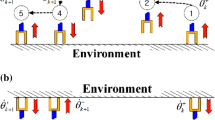Abstract
Stochastic Optimal Control (SOC) typically considers noise only in the process model, i.e. unknown disturbances. However, in many robotic applications involving interaction with the environment, such as locomotion and manipulation, uncertainty also comes from lack of precise knowledge of the world, which is not an actual disturbance. We analyze the effects of also considering noise in the measurement model, by developing a SOC algorithm based on risk-sensitive control, that includes the dynamics of an observer in such a way that the control law explicitly depends on the current measurement uncertainty. In simulation results on a simple 2D manipulator, we have observed that measurement uncertainty leads to low impedance behaviors, a result in contrast with the effects of process noise that creates stiff behaviors. This suggests that taking into account measurement uncertainty could be a potentially very interesting way to approach problems involving uncertain contact interactions.
Access this chapter
Tax calculation will be finalised at checkout
Purchases are for personal use only
Preview
Unable to display preview. Download preview PDF.
Similar content being viewed by others
References
Stefan Schaal and Atkeson C. Learning control in robotics. Robotics and Automation Magazine, 17:20–29, 2010.
Situan Feng, Xinjilefu X., Weiwei Huang, and Christopher G. Atkeson. 3D walking based on online optimization. Humanoids Atlanta, pages 21–27, 2013.
Michael Neunert, Cedric de Crousaz, Fadri Furrer,Mina Kamel, Farbod Farshidian, Roland Siegwart, and Jonas Buchli. Fast Nonlinear Model Predictive Control for Unified Trajectory Optimization and Tracking. ICRA, 2016.
Yuval Tassa, Tom Erez, and E Todorov. Fast model predictive control for reactive robotic swimming.
Yuval Tassa, Nicolas Mansard, and Emo Todorov. Control-limited differential dynamic programming. In ICRA, Hong Kong, China, pages 1168–1175, 2014.
Emmanuel Todorov andWeiwei Li. A generalized iterative LQG method for locallyoptimal feedback control of constrained nonlinear stochastic systems. ACC 2005, 1:300 – 306, 2005.
David Mayne. A Second-order Gradient Method for Determining Optimal Trajectories of Non-linear Discrete-time Systems. Int. Journal of Control, 3(1):85–95, 1966.
Athanasios Sideris and James Bobrow. An efficient sequential linear quadratic algorithm for solving nonlinear optimal control problems. IEEE TAC, 50(12):2043– 2047, 2005.
Aaron M. Johnson, Jennifer E. King, and Siddhartha Srinivasa. Convergent Planning. IEEE Robotics and Automation Letters, 1(2):1044–1051, 2016.
Weiwei Li and Emmanuel Todorov. Iterative linearization methods for approximately optimal control and estimation of non-linear stochastic system. International Journal of Control, 80(9):1439 – 1453, 2007.
Emmanuel Todorov. Stochastic optimal control and estimation methods adapted to the noise characteristics of the sensorimotor system. Neural Computation, 17(5), 2005.
D. Jacobson. Optimal stochastic linear systems with exponential performance criteria and their relation to deterministic differential games. IEEE Transactions on Automatic Control, 18(2):124–131, 1973.
Farbod Farshidian and Jonas Buchli. Risk Sensitive, Nonlinear Optimal Control: Iterative Linear Exponential-Quadratic Optimal Control with Gaussian Noise. 2015.
Krishnamurthy Dvijotham and Emanuel Todorov. A Unifying Framework for Linearly Solvable Control. CoRR, abs/1202.3715, 2012.
Jason Speyer, John Deyst, and D. Jacobson. Optimization of stochastic linear systems with additive measurement and process noise using exponential performance criteria. IEEE Transactions on Automatic Control, 19(4):358–366, 1974.
MR. James, JS. Baras, and LJ. Elliot. Risk-sensitive control and dynamic games for partially observed discrete-time nonlinear systems. IEEE Transactions on Automatic Control, 39(4):780–792, 1994.
P. Whittle and J. Kuhn. A hamiltonian formulation of risk-sensitive linear quadratic gaussian control. International Journal on Control, 43:1–12, 1986.
Horacio Wio. Path Integrals for Stochastic Processes. World Scientific, 2013.
Sergey Levine and Vladlen Koltun. Guided Policy Search. In Proceedings of the30th International Conference in Machine Learning, pages, pages 1–9, 2013.
Author information
Authors and Affiliations
Corresponding author
Editor information
Editors and Affiliations
Rights and permissions
Copyright information
© 2020 Springer Nature Switzerland AG
About this chapter
Cite this chapter
Pontón, B., Schaal, S., Righetti, L. (2020). On the Effects of Measurement Uncertainty in Optimal Control of Contact Interactions. In: Goldberg, K., Abbeel, P., Bekris, K., Miller, L. (eds) Algorithmic Foundations of Robotics XII. Springer Proceedings in Advanced Robotics, vol 13. Springer, Cham. https://doi.org/10.1007/978-3-030-43089-4_50
Download citation
DOI: https://doi.org/10.1007/978-3-030-43089-4_50
Published:
Publisher Name: Springer, Cham
Print ISBN: 978-3-030-43088-7
Online ISBN: 978-3-030-43089-4
eBook Packages: Intelligent Technologies and RoboticsIntelligent Technologies and Robotics (R0)




